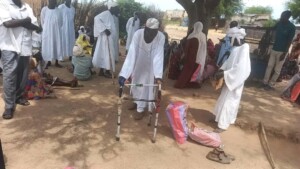Three die of cholera in South Darfur’s Kalma camp
On Friday, three residents of Kalma camp for the displaced near Nyala, capital of South Darfur died of cholera. With the spread of cholera to South Darfur, 14 Sudanese states are now affected.
Hussein Abusharati told Radio Dabanga that three other Kalma camp residents are infected as well.
“The South Darfur health authorities and staff of health organisations working in the state rushed to the camp, and allocated two emergency sites in the camp to receive the patients,” he said. “The organisations directed us to immediately report any suspected cases.”
On Friday, three residents of Kalma camp for the displaced near Nyala, capital of South Darfur died of cholera. With the spread of cholera to South Darfur, 14 Sudanese states are now affected.
Hussein Abusharati told Radio Dabanga that three other Kalma camp residents are infected as well.
“The South Darfur health authorities and staff of health organisations working in the state rushed to the camp, and allocated two emergency sites in the camp to receive the patients,” he said. “The organisations directed us to immediately report any suspected cases.”
Kalma, hosting more than 120,000 displaced, is one of the largest camps in Darfur.
In the Naivasha camp for the displaced near Shangil Tobaya in North Darfur’s Tawila locality, a girl died on Friday.
“This brings the number of cholera deaths to 12 in a week,” a Naivasha camp elder reported to this station. “With eight new cases last week, 96 camp residents are being treated for the disease.”
The elder complained about the poor health care in the makeshift isolation centre, the overcrowded ward, and the lack of medical staff in the camp clinic.
He said they have called on the North Darfur health authorities to urgently provide adequate treatment and medical staff, and to organise awareness campaigns about the importance of hygiene and sanitation.
‘Watery diarrhoea’
The health unit in the area of Um El Kheirat area in South Kordofan’s El Tadamon locality received two new cases of cholera on Friday. The head of the unit reported that two older cases are still being treated.
The Blue Nile state Minister of Health, Abdelrahman Bilal, reported last week that at least 40 people in the state are suffering from “acute watery diarrhoea”.
The first cases were recorded in Blue Nile state in August last year. The federal Health Ministry initially neglected the reports. A few months later, after the disease spread to neighbouring states, medical doctors began to mention cholera.
Sudan’s security authorities however refused to call the disease by its real name and instead continue to refer to it as “watery diarrhoea”. On 1 June, the Sudanese Minister of Health reported to the federal parliament that between August 2016 and May 2017, 14,659 people were infected with “watery diarrhoea”. 292 patients died.
The UN Office for the coordination of Humanitarian Affairs (OCHA) in Sudan reported it its bulletin of 5-18 June that according to the federal Ministry of Health and the World Health Organization, about 16,600 suspected cases of “Acute Watery Diarrhoea” were reported in the country, including 317 deaths.
Health management
“The collapse of the health services in the country requires intervention by international organisations to help eradicating the epidemic, and that can only be done if the government officially declares the cholera outbreak,” Sarah Abdeljaleel, Media Secretary of the Sudanese Doctors' Union in the United Kingdom and Ireland told Radio Dabanga last week.
This week, Sudanese university professors have appealed to the federal cabinet and parliament to restore “the former health management mechanism” in Sudan.
In a press statement, they pointed to the nation’s “successful experience in managing the health system before the federal system came into being”. They further urged the revision of the Constitution and laws governing the health system in the country.
Follow #CholeraInSudan, #ألكوليرا_السودان











 and then
and then